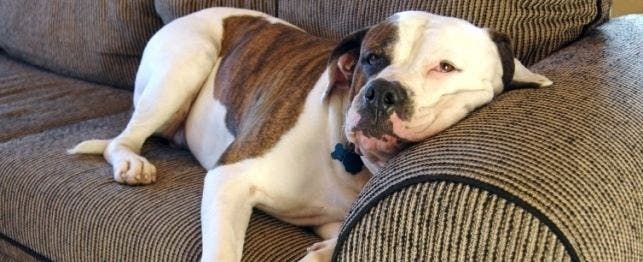
Why Do Dogs Snore?
Understanding Why Dogs Snore
During the course of examinations and appointments, I love to chat with clients about their pets. Sometimes it even leads them to come up with a joke or two that makes me laugh, as was the case a few days ago. This patient in particular was a chubby little Beagle who apparently had quite the snoring habit. His owner put it a little more creatively though -“We call him ‘our little lumberjack’ because his snoring sounds just like a chainsaw!”
Well, what’s going on there? Why DO dogs snore, and what can be done about it?
In the most basic terms, the snoring sound itself occurs when there is some type of blockage in the upper respiratory tract. This blockage can be anywhere along the respiratory path from the nose to the trachea (the tube that takes air to the lungs). As air is forced through these passages, it moves unevenly past the blockage and creates the groaning, creaking noise we recognize as snoring.
There are several factors that can make your dog snore including abnormal confirmation and structure of the face, obesity, nasal congestion, infections, polyps, allergies, medications and sometimes even the sleeping position.
Take a look at these common causes for snoring and see if any sounds like something your dog might experience:
7 Reasons Why Dogs Snore
- Flat Faces – Dog breeds with flat faces (brachycephalic breeds) or pushed-in noses often have several structural abnormalities that affect their noses and airways. Their cute squished up faces typically mean that the same number of body structures must fit into a much smaller space. The nasal cavity, already quite small in dogs, is even smaller in these dogs but must hold similar tissue and structures. Redundant skin folds (like the wrinkles in a Pug’s face) often result in blocked passages and snoring. Breeds which are commonly affected include Boxers, Pugs, Pekingese, Shih Tzus, Boston Terriers and Bulldogs. Some of these breeds require surgery to remove excess tissue and relieve the blockage.
- Soft Palate Disorders – Soft palate disorders are usually congenital defects of the fleshy tissue at the back of the throat (soft palate and epiglottis) these normally separates the oral and nasal cavities. The most common disorders are a defect or “cleft” in the palate or an elongation of the palate. This overlapping causes an obstruction of the airway during breathing. The sound the pet makes (stridor) worsens during exercise. Treatment of an elongated soft palate is surgical. This condition is seen also in the brachycephalic breeds group.
- Obesity – A chubby dog isn’t always a happy dog. A few extra pounds can cause a lot of extra pressure on a dog’s respiratory system and chest cavity. Excess weight can even result in brief interruptions in breathing during sleep, a condition commonly known as sleep apnea in humans. Thankfully, weight loss typically eliminates snoring in these cases.
- Nasal Congestion – Just like humans, dogs are more likely to snore when their noses are clogged. Nasal congestion can result from allergies, nasal infections or even nasal tumors. Allergies can be caused by dust, house dust mites, mildew, mold, and smoke.
- Medications – Some medications such as muscle relaxants or those used to treat pain can lower respiratory rate or even constrict air passages.
- Weather – Dry air can cause nasal tissues to stick together, resulting in snoring from dogs who are typically silent sleepers. In some individuals, changes in altitude due to travel or even varying air pressure can increase snoring.
- Sleep Positions – Some people tend to snore more when they sleep on their backs and less when they sleep on their sides. Dogs also can snore more or less based on their sleep positions. Dogs who sleep on their back and stomach typically place more pressure on their respiratory tracts, while those who sleep on their sides usually experience less.
For the most part, snoring in dogs is not a problem as long as they are getting plenty of good sleep and they continue to breathe normally while awake. Snoring becomes a problem if it interrupts or prevents normal sleep patterns or causes difficulty breathing during exercise.
If you are worried about your dog’s snoring or see a behavior change, nasal discharge, sneezing or a bloody nose, please see your veterinarian for an examination. Ensure that there is no medical reason for the symptoms.